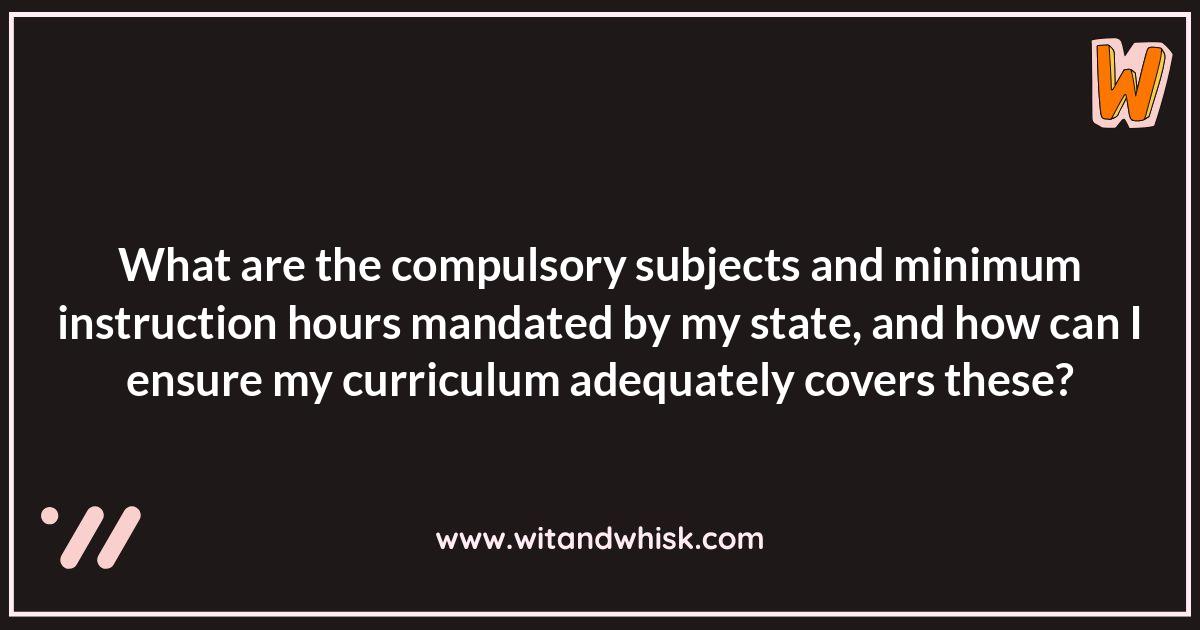150 Best Questions To Ask About Homeschooling: You NEED to Ask Before You Start
Considering homeschooling? Overwhelmed by where to even begin? You’re not alone! Many parents feel that initial rush of excitement followed by a wave of “Okay, but *how*?”

Choosing to homeschool is a big decision, and asking the right questions about homeschooling upfront can set you up for success. This post dives into the essential questions you need to consider before taking the plunge, covering everything from curriculum choices to legal requirements and even your own teaching style.
Get ready to explore these crucial questions and gain the clarity you need to confidently embark on your homeschooling journey!
Best Questions To Ask About Homeschooling: You NEED to Ask Before You Start
- What are the legal requirements for homeschooling in my state/region, and how do I ensure compliance?
- What are my child’s learning styles and how can I tailor a curriculum to effectively meet their individual needs?
- How can I create a structured yet flexible homeschooling schedule that balances learning with other activities?
- What resources (curriculum, online programs, support groups) are available to me, and how do I evaluate their quality and suitability?
- How will I assess my child’s progress and ensure they are meeting academic standards without traditional grades?
- What methods can I use to foster socialization and peer interaction for my homeschooled child?
- How will I address subjects I’m not confident in teaching myself?
- What are the long-term educational goals for my child, and how does homeschooling align with those goals?
- How can I prevent burnout, both for myself and my child, while homeschooling?
- What is my budget for homeschooling, and how can I maximize resources within that budget?
- How can I integrate real-world learning experiences into our homeschooling journey?
- What strategies can I employ to handle challenging behavior or learning difficulties during homeschooling?
- How will I document my child’s learning for potential future college applications or other academic pursuits?
- How do I create a dedicated and inspiring learning environment within my home?
- What are the potential benefits and drawbacks of different homeschooling philosophies (e.g., unschooling, classical, Charlotte Mason)?
- How will I balance homeschooling responsibilities with other family commitments and personal needs?
- What support systems (online communities, local groups) can I tap into for encouragement and advice?
- How can I cultivate a lifelong love of learning in my child through homeschooling?
- What are my personal strengths and weaknesses as an educator, and how can I improve my teaching skills?
- How can I adapt my homeschooling approach as my child grows and their needs evolve?
What Homeschooling Curriculum Questions Should You Consider?
Choosing a homeschool curriculum can feel overwhelming! What teaching style resonates with you and your child? Does it cover your state’s requirements? How does it cater to different learning styles or special needs? Considering these questions will help you find a curriculum that fosters a love of learning and sets…

- Beyond core subjects, does the curriculum offer opportunities for exploring unique interests and talents of the child?
- How does the curriculum cater to diverse learning styles (visual, auditory, kinesthetic) to ensure effective knowledge absorption?
- Does the curriculum align with my state’s educational standards, and what are the implications if it doesn’t?
- What is the curriculum’s approach to assessment, and how will I track my child’s progress effectively?
- How adaptable is the curriculum to accommodate my child’s learning pace and any special needs?
- Does the curriculum offer opportunities for hands-on learning, projects, and real-world application of knowledge?
- What resources are available to support me as the homeschool parent, such as lesson plans, teacher guides, or online forums?
- How does the curriculum encourage critical thinking, problem-solving, and creativity in my child?
- Is the curriculum secular or faith-based, and does it align with our family’s values and beliefs?
- Does the curriculum provide opportunities for socialization and interaction with other children?
- What is the cost of the curriculum, and what payment options are available?
- How much parental involvement is required, and does it fit my schedule and comfort level?
- Does the curriculum offer flexibility in terms of scheduling and lesson pacing?
- What is the curriculum’s focus: skill development, knowledge acquisition, or both?
- Does the curriculum teach how to use essential equipment effectively, such as tutorials or workshops?
Essential Homeschooling Legal Questions: Compliance Matters
Homeschooling opens exciting doors, but understanding legal requirements is key. “Essential Homeschooling Legal Questions: Compliance Matters” should be on your list. What are your state’s specific regulations for curriculum, testing, and reporting? Ignoring these can lead to unnecessary stress. Asking the right legal questions upfront ensures a smooth and compliant…

- What are the compulsory subjects and minimum instruction hours mandated by my state, and how can I ensure my curriculum adequately covers these?
- How does my state define homeschooling, and what are the specific requirements for parental qualifications or educational background?
- What records of attendance, curriculum, and student progress are legally required to be maintained, and for how long?
- Are there any standardized testing or portfolio review requirements for homeschooled students in my state, and how do I prepare for these assessments?
- How do I properly withdraw my child from public or private school to begin homeschooling, and what documentation is required?
- What options are available for dual enrollment in public school courses or extracurricular activities while homeschooling, and what are the eligibility criteria?
- Are there any restrictions on homeschooling multiple children of different ages or grade levels simultaneously?
- How do I comply with compulsory vaccination laws while homeschooling, and what exemptions are available?
- What are the legal implications of hiring a tutor or co-op teacher to supplement my homeschooling curriculum?
- If we move to a different state or country, how will the homeschooling laws differ, and what adjustments will I need to make?
- What are the legal considerations for homeschooling a child with special needs, and what accommodations or modifications are required?
- How does my state address the issue of truancy or educational neglect in homeschooling families, and what steps can I take to prevent these concerns?
- What are the rules regarding homeschooling if I have a shared custody arrangement with my child’s other parent?
- What resources are available to help me understand and comply with homeschooling laws in my state, such as legal organizations or support groups?
- How do I navigate the legal requirements for homeschooling while traveling or living abroad for extended periods?
Homeschooling Socialization Questions: Addressing Concerns
Considering homeschooling? You’ll likely encounter socialization questions. It’s a valid concern! When exploring homeschooling options, ask about co-ops, extracurricular activities, and community involvement opportunities. Understand how the curriculum incorporates social interaction and how your child will connect with peers. A thoughtful plan can ensure a well-rounded and socially vibrant homeschool…

- What strategies can be used to cultivate meaningful friendships for homeschooled children with peers who attend traditional schools?
- How can homeschooling families effectively navigate social situations where their educational choices are met with skepticism or criticism?
- In what ways does homeschooling foster unique social skills, such as self-direction and adaptability, that might not be emphasized in traditional schooling environments?
- What are the long-term social outcomes for homeschooled individuals, and how do they compare to those of their traditionally schooled peers?
- How can technology, such as online forums and virtual meetups, be leveraged to create social connections for homeschooled children, especially in rural areas?
- What role do extracurricular activities, such as sports, clubs, and volunteer work, play in the socialization of homeschooled children?
- How can homeschooling parents ensure their children develop strong communication and collaboration skills necessary for success in a diverse and interconnected world?
- What are the benefits and drawbacks of homeschooling co-ops as a means of providing socialization opportunities and shared learning experiences?
- How can homeschooled children develop strong social-emotional skills, such as empathy, conflict resolution, and self-awareness, outside of a traditional classroom setting?
- What methods can be employed to assess a homeschooled child’s social development and address any potential areas of concern?
- How does homeschooling accommodate the social needs of children with special needs or unique learning styles?
- What are the potential social challenges that homeschooled children might face as they transition into adulthood, and how can parents prepare them for these challenges?
- How can homeschooling families connect with other homeschooling families in their local community to create a supportive social network?
- In what ways can homeschooled children learn to interact with individuals of different ages, backgrounds, and perspectives, fostering a broader understanding of society?
- What is the impact of homeschooling on the development of social skills related to navigating peer pressure and making responsible choices?
Homeschooling Budget Questions: Affordability and Resources
Homeschooling: can you really afford it? Beyond curriculum costs, consider supplies, activities, and potential income loss if a parent stays home. Explore free resources like library programs and online materials. Ask yourself: what’s our budget, and how can we creatively maximize resources to provide a quality education without breaking the…

- Beyond curriculum costs, what are the hidden or less obvious expenses associated with homeschooling?
- How can I effectively utilize community resources and free educational materials to minimize homeschooling expenses?
- What are the potential tax deductions or credits available to homeschooling families in my region?
- How can I create a realistic budget for homeschooling that aligns with my family’s financial situation and priorities?
- What are the most cost-effective curriculum options for homeschooling multiple children of different ages and grade levels?
- How can I find affordable extracurricular activities and enrichment opportunities for my homeschooled child?
- What are the potential savings associated with homeschooling compared to private school or daycare?
- How can I create a sustainable homeschooling budget that allows for flexibility and unexpected expenses?
- What are the most cost-effective ways to acquire homeschooling resources, such as library loans, used books, or online subscriptions?
- How can I evaluate the long-term financial impact of homeschooling on my career and earning potential?
- What are the options for participating in homeschooling cooperatives or groups to share resources and reduce costs?
- How can I prioritize spending on essential homeschooling resources while minimizing unnecessary expenses?
- What are the potential costs associated with hiring tutors or specialists to supplement my homeschooling curriculum?
- How can I develop a system for tracking homeschooling expenses and monitoring my budget effectively?
- What are the long-term savings associated with homeschooling in areas such as transportation, school supplies and clothing?
Key Homeschooling Time Management Questions: Balancing Life
Homeschooling brings freedom, but also challenges. How do we juggle lesson plans with laundry? What does a realistic daily schedule look like? Where does personal time fit in? These key time management questions are essential. Finding the right balance between homeschooling, chores, and self-care is vital for everyone’s happiness and…

- How can I realistically schedule homeschooling around my existing work commitments and personal needs without burning out?
- What strategies can be used to create a flexible homeschooling schedule that adapts to unexpected events or changes in routine?
- How do I prioritize different subjects and activities within our homeschooling schedule, ensuring a well-rounded education without feeling overwhelmed?
- What are some effective methods for incorporating breaks and downtime into our homeschooling day to prevent fatigue and maintain focus?
- How do I create a realistic homeschooling schedule for multiple children of different ages and learning styles?
- What techniques can I use to minimize distractions and maintain focus during homeschooling sessions, both for myself and my child?
- How do I factor in time for socialization and extracurricular activities into our homeschooling schedule, ensuring a well-rounded experience?
- What resources are available to help me create a structured homeschooling plan that meets my child’s individual needs and learning goals?
- How do I incorporate household chores and other responsibilities into our homeschooling schedule, teaching valuable life skills while managing our time effectively?
- What strategies can be used to prevent procrastination and stay on track with our homeschooling schedule?
- How do I create a homeschooling schedule that allows for flexibility and spontaneity, while still meeting our educational goals?
- What are some effective methods for assessing my child’s progress and adjusting our homeschooling schedule accordingly?
- How do I create a homeschooling schedule that balances academic learning with hands-on activities, field trips, and other enriching experiences?
- What are some tips for creating a positive and supportive homeschooling environment that promotes learning and motivation?
- How can I balance structured learning time with unstructured free play and exploration to foster creativity and imagination?
Homeschooling Special Needs Questions: Tailoring Education
Homeschooling a child with special needs? That’s a journey demanding personalized support. Before diving in, ask yourself: What specific therapies are crucial? How will I adapt curriculum to their learning style? What community resources can enrich their experience? Finding these answers will pave the way for a truly tailored and…

- Beyond academics, what are the most effective strategies for cultivating a child’s self-esteem and social skills within a homeschooling environment tailored to their specific needs?
- How can you adapt homeschooling to address sensory sensitivities or processing challenges common in special needs learners?
- What legal rights and protections are available to homeschooling families with special needs children, and how can you advocate for their needs?
- How do you create a collaborative IEP (Individualized Education Program) with therapists and specialists when homeschooling a child with special needs?
- What are some effective strategies for managing behavioral challenges at home while maintaining a positive and supportive learning environment?
- How can technology be leveraged to create accessible and engaging learning experiences for children with diverse learning abilities?
- What are the best ways to document and showcase a child’s progress when homeschooling with special needs, especially for college applications or future employment?
- How can you integrate life skills and vocational training into your homeschooling curriculum to prepare them for independent living and potential employment?
- How can you create a supportive and inclusive environment for a child with special needs to interact with peers, both within and outside of the homeschooling community?
- What are the best resources for finding specialized curriculum and learning materials tailored to different special needs?
- How can you build a strong support network for yourself as a homeschooling parent of a child with special needs?
- What are the ethical considerations of modifying a curriculum to meet a child’s needs, and how do you balance flexibility with academic rigor?
- How do you navigate the emotional challenges of homeschooling a child with special needs, for both the child and the parent?
- How can you foster independence and self-advocacy skills in a child with special needs through homeschooling?
- How do you balance focusing on a child’s strengths while also addressing their areas of need?
Homeschooling Goals Questions: Defining Your Educational Vision

- What are your core educational values, and how will homeschooling reflect them?
- Beyond academics, what life skills do you want your child to develop?
- How will you tailor the learning experience to your child’s unique strengths and weaknesses?
- What role will creativity and innovation play in your homeschooling curriculum?
- How will you foster a love of learning and curiosity in your child?
- What specific learning goals do you have for each academic year?
- How will you measure your child’s progress and success in homeschooling?
- What resources are essential to meeting your homeschooling goals?
- How will you address any challenges or setbacks that may arise during homeschooling?
- What steps can you take to ensure your child feels supported and encouraged during homeschooling?
- What role will socialization play in your child’s homeschooling experience?
- How will you adapt your homeschooling approach as your child grows and their needs evolve?
- What support systems do you need to establish before starting homeschooling?
- What are your long-term educational aspirations for your child?
- How will homeschooling prepare your child for their future career or life path?
Homeschooling Assessment Questions: Measuring Progress Effectively
Homeschooling questions often center on assessment. How do you truly know your child is progressing? Effective assessments aren’t just about grades; they’re about understanding. What methods best reveal their grasp of concepts? Consider portfolios, projects, and informal conversations alongside standardized tests to paint a complete picture of their learning journey.

- How can I objectively measure my child’s progress in subjects that are not easily quantifiable, such as art or music?
- What are the best methods for tracking skill development and knowledge retention over the long term, beyond standardized tests?
- How can I tailor assessment methods to my child’s unique learning style and strengths, ensuring a fair and accurate evaluation of their abilities?
- What role should self-assessment play in my child’s learning journey, and how can I encourage them to reflect on their own progress and identify areas for improvement?
- How can I use a portfolio-based assessment approach to showcase my child’s work and demonstrate their skills to potential colleges or employers?
- What strategies can I use to provide constructive feedback that is both encouraging and informative, helping my child to learn from their mistakes and grow as a learner?
- How can I incorporate real-world projects and experiences into my homeschooling curriculum to assess my child’s ability to apply their knowledge in practical situations?
- What tools can be used to track my child’s learning progress and identify areas where they may need additional support?
- How do I balance the need for structure and accountability with the desire to foster creativity and independence in my child’s learning?
- How can I ensure my child is meeting all necessary learning standards?
- How can I assess my child’s comprehension of complex concepts without relying solely on rote memorization?
- Beyond grades, what alternative methods can I use to measure my child’s engagement and enthusiasm for learning?
- How can I create a personalized assessment plan that reflects my child’s individual goals and aspirations?
- How can I use data from assessments to inform my teaching practices and improve the overall quality of my homeschooling program?
- What steps can I take to ensure that my child is prepared for standardized tests or other assessments that may be required for college or future employment?





